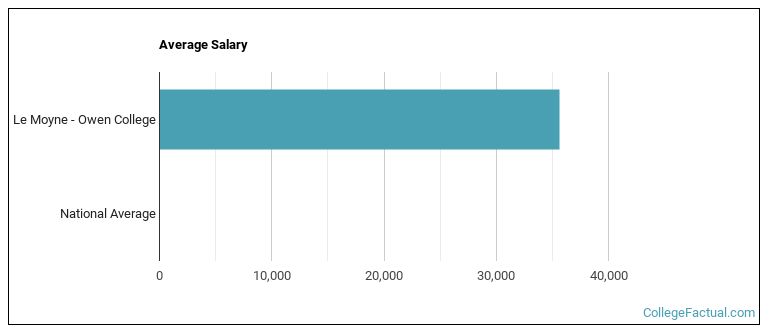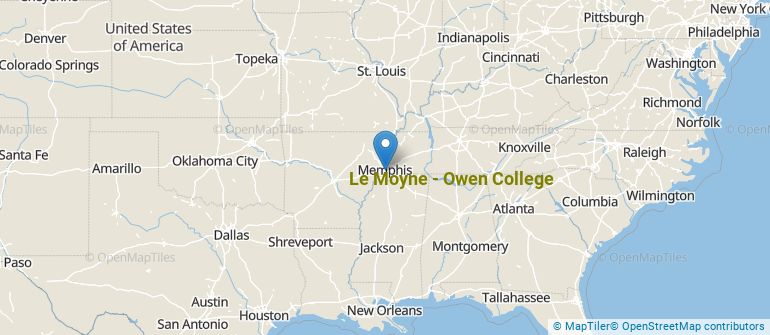 by our College Data Analytics Team
by our College Data Analytics TeamExplore the best ranked schools for the programs you are most interested in.
Le Moyne - Owen College was not ranked in College Factual's 2025 Best Overall Colleges report. This could be for a number of reasons, including lack of data.
With an acceptance rate of 100%, Le Moyne - Owen College is easier to get into than many other schools. But that doesn't mean you can slack off on your application. Make sure to treat this school like any other when submitting requested materials and documents.
The student to faculty ratio at Le Moyne - Owen College is an impressive 11 to 1. That's quite good when you compare it to the national average of 15 to 1. This is a good sign that students at the school will have more opportunities for one-on-one interactions with their professors.
Another measure that is often used to estimate how much access students will have to their professors is how many faculty members are full-time. The idea here is that part-time faculty tend to spend less time on campus, so they may not be as available to students as full-timers.
The full-time faculty percentage at Le Moyne - Owen College is 48%. This is comparable to the national average of 47%.
The freshmen retention rate tells us what percentage of first-year, full-time students choose to continue on to their sophomore year at a particular school. The rate at Le Moyne - Owen College is 63%, which is about average when compared to the national rate of 68%.
When we say that a student has graduated on time, we mean that they have finished their bachelor's degree within four years. The on-time graduation rate at Le Moyne - Owen College is 3%. That's lower than the national rate of 33.3%
Find out more about the retention and graduation rates at Le Moyne - Owen College.
During the 2017-2018 academic year, there were 654 undergraduates at Le Moyne - Owen College with 555 being full-time and 99 being part-time.
The net price is calculated by adding tuition, room, board and other costs and subtracting financial aid.Note that the net price is typically less than the published for a school. For more information on the sticker price of Le Moyne - Owen College, see our tuition and fees and room and board pages.
It's not uncommon for college students to take out loans to pay for school. In fact, almost 66% of students nationwide depend at least partially on loans. At Le Moyne - Owen College, approximately 65% of students took out student loans averaging $6,502 a year. That adds up to $26,008 over four years for those students.

See which majors at Le Moyne - Owen College make the most money.
Get more details about the location of Le Moyne - Owen College.

Contact details for Le Moyne - Owen College are given below.
| Contact Details | |
|---|---|
| Address: | 807 Walker Ave, Memphis, TN 38126-6595 |
| Phone: | 901-435-1000 |
| Website: | www.loc.edu/ |
| Most Popular Majors | Bachelor’s Degrees | Average Salary of Graduates |
|---|---|---|
| Business Administration & Management | 36 | NA |
| General Biology | 19 | NA |
| Criminal Justice & Corrections | 17 | NA |
| Sociology | 17 | NA |
| Interdisciplinary Studies | 14 | NA |
| Social Work | 8 | NA |
| General English Literature | 5 | NA |
| Fine & Studio Arts | 5 | NA |
| Computer Science | 4 | NA |
| Communication & Journalism (Other) | 3 | NA |
Online learning is becoming popular at even the oldest colleges and universities in the United States. Not only are online classes great for returning adults with busy schedules, they are also frequented by a growing number of traditional students.
In 2022-2023, 605 students took at least one online class at Le Moyne - Owen College. This is an increase from the 0 students who took online classes the previous year.
| Year | Took at Least One Online Class | Took All Classes Online |
|---|---|---|
| 2022-2023 | 605 | 0 |
| 2021-2022 | 0 | 0 |
| 2020-2021 | 0 | 0 |
| 2018-2019 | 0 | 0 |
Learn more about online learning at Le Moyne - Owen College.
Footnotes
*The racial-ethnic minorities count is calculated by taking the total number of students and subtracting white students, international students, and students whose race/ethnicity was unknown. This number is then divided by the total number of students at the school to obtain the racial-ethnic minorities percentage.
References
More about our data sources and methodologies.